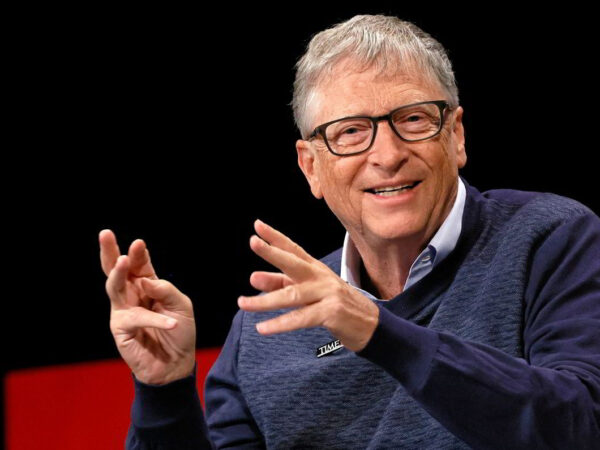Bill Gates, the co-founder of Microsoft, recently made a bold prediction about the future of Artificial Intelligence (AI) and its potential to disrupt major tech giants such as Google and Amazon. During a podcast episode titled “In Good Company” hosted by philanthropist Nicolai Tangen, Gates shared his insights on the impact of AI on the tech industry.
Gates noted that the rapid development of AI technology could lead to the displacement of Google Search, Amazon, and other major players in the industry. He mentioned that Microsoft, the company he co-founded, has integrated AI into its products and has been able to make significant progress in the search domain. Gates believes that the first company to develop a successful AI program will become the market leader and could potentially reshape user behavior.
According to Gates, the rise of AI-powered personal agents is the key factor that will transform the tech landscape. He predicts that within a decade, users will no longer need to visit search sites, productivity platforms, or online marketplaces like Amazon. AI will become so advanced and personalized that it will understand users’ preferences and make decisions on their behalf. Whether it’s purchasing gifts or planning trips, the AI-powered personal agent will optimize the experience, disregarding factors like the best price on Amazon or elsewhere.
While Gates expressed confidence in Microsoft’s ability to compete in this space, he also acknowledged the potential for startups to emerge as winners in the AI race. The future winner, according to Gates, will be either a startup or an established tech giant that successfully harnesses the power of AI.
Microsoft has been actively investing in AI research and development, recently unveiling an AI-powered version of its search engine, Bing. The company aims to challenge Google’s dominance in the search engine market by delivering richer, more visual answers and integrating chat experiences. Microsoft is also collaborating with OpenAI to make AI skills accessible to developers and revolutionize the search domain.
On the other hand, Google is determined to maintain its position as a search giant and has introduced its own AI chatbot called Bard. Bard is an experimental conversational AI service that combines vast amounts of information with the intelligence of large language models to provide high-quality responses.
The competition between Microsoft and Google, along with the growing adoption of AI by various tech companies, signals a significant shift in the search space. With advancements like OpenAI’s ChatGPT and Google’s Bard, the AI field has made remarkable progress, prompting companies to incorporate AI tools into their products to enhance user experiences.
As AI continues to evolve, it will undoubtedly reshape industries and revolutionize the way we interact with technology. While Gates’ predictions may be speculative, they highlight the growing influence of AI and the potential for major disruptions in the tech industry. The race for AI dominance is on, and it will be fascinating to see which companies emerge as winners in this rapidly evolving landscape.
Gates noted that the rapid development of AI technology could lead to the displacement of Google Search, Amazon, and other major players in the industry. He mentioned that Microsoft, the company he co-founded, has integrated AI into its products and has been able to make significant progress in the search domain. Gates believes that the first company to develop a successful AI program will become the market leader and could potentially reshape user behavior.
According to Gates, the rise of AI-powered personal agents is the key factor that will transform the tech landscape. He predicts that within a decade, users will no longer need to visit search sites, productivity platforms, or online marketplaces like Amazon. AI will become so advanced and personalized that it will understand users’ preferences and make decisions on their behalf. Whether it’s purchasing gifts or planning trips, the AI-powered personal agent will optimize the experience, disregarding factors like the best price on Amazon or elsewhere.
While Gates expressed confidence in Microsoft’s ability to compete in this space, he also acknowledged the potential for startups to emerge as winners in the AI race. The future winner, according to Gates, will be either a startup or an established tech giant that successfully harnesses the power of AI.
Microsoft has been actively investing in AI research and development, recently unveiling an AI-powered version of its search engine, Bing. The company aims to challenge Google’s dominance in the search engine market by delivering richer, more visual answers and integrating chat experiences. Microsoft is also collaborating with OpenAI to make AI skills accessible to developers and revolutionize the search domain.
On the other hand, Google is determined to maintain its position as a search giant and has introduced its own AI chatbot called Bard. Bard is an experimental conversational AI service that combines vast amounts of information with the intelligence of large language models to provide high-quality responses.
The competition between Microsoft and Google, along with the growing adoption of AI by various tech companies, signals a significant shift in the search space. With advancements like OpenAI’s ChatGPT and Google’s Bard, the AI field has made remarkable progress, prompting companies to incorporate AI tools into their products to enhance user experiences.
As AI continues to evolve, it will undoubtedly reshape industries and revolutionize the way we interact with technology. While Gates’ predictions may be speculative, they highlight the growing influence of AI and the potential for major disruptions in the tech industry. The race for AI dominance is on, and it will be fascinating to see which companies emerge as winners in this rapidly evolving landscape.

Neo Gamma: The Next-Gen Humanoid AI Robot for Home Assistance

Google Maps to revolutionize navigation with Satellite features, eliminating dead zones

Neo Gamma: The Next-Gen Humanoid AI Robot for Home Assistance

Google Maps to revolutionize navigation with Satellite features, eliminating dead zones

Exploring the Enchanting Wonders of Hawaii- A Journey to Remember

Vibrant Activities in Ha Nam Cultural and Tourism Week 2023

Exploring the Enchanting Wonders of Hawaii- A Journey to Remember

Unveiling the Heritage Guide: Vietnam Airlines’ Exquisite Travel Companion for Exploring Vietnam

Thomson Medical Group Expands Southeast Asian Presence with Acquisition of FV Hospital in Vietnam

By Rotation: The Startup Revolutionizing Fashion with Peer-to-Peer Clothing Rental

Neo Gamma: The Next-Gen Humanoid AI Robot for Home Assistance

Google Maps to revolutionize navigation with Satellite features, eliminating dead zones

Valentino Joins the Metaverse: An Exciting Partnership with UNXD

Coinbase Faces Technical Woes Amidst Bitcoin Surge to $64,000

Coinbase Faces Technical Woes Amidst Bitcoin Surge to $64,000

Exploring the Enchanting Wonders of Hawaii- A Journey to Remember

Abode: Artist Challenges Adobe’s Dominance with Lifetime Creative Software Suite

By Rotation: The Startup Revolutionizing Fashion with Peer-to-Peer Clothing Rental

Threads App’s Rollercoaster Ride: Plummeting 82% of Users Raise Concerns for Meta’s Social Experiment

Job Interview Red Flags: Phrases to avoid according to a former Google recruiter

Exploring the Enchanting Wonders of Hawaii- A Journey to Remember

Vibrant Activities in Ha Nam Cultural and Tourism Week 2023

Thomson Medical Group Expands Southeast Asian Presence with Acquisition of FV Hospital in Vietnam


